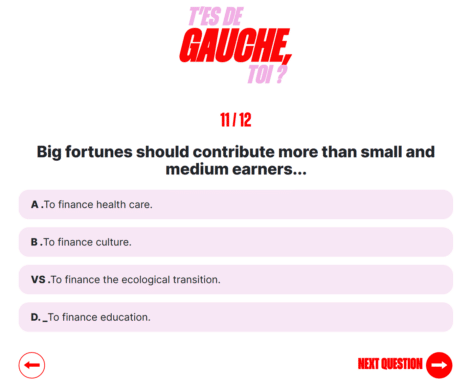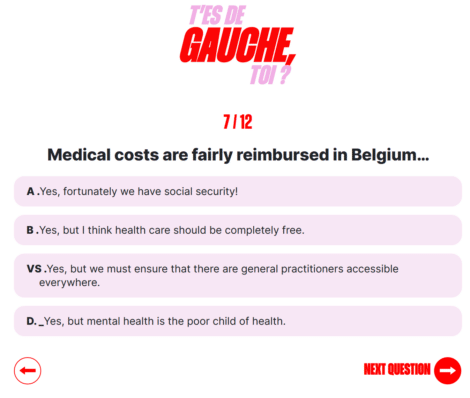Find out in this article how the Socialist Party created a fake survey for electoral purposes.

As a survey agency, we usually provide clear answers to important problems that our customers may have. So, we were surprised to discover that the Belgian Socialist Party was misusing the survey technique for electoral purposes. The survey proposed by the Socialist Party on a dedicated website called “Are you a leftist?” is supposed to propose to find out your political allegiance. While the intention is laudable on the eve of the elections, this survey is riddled with errors. It has no purpose but to capture your data for electoral purposes.
Contact our Agency to conduct your surveys
“Are you a leftist?”: a survey that isn’t a survey at all
The survey’s home page soberly proposes discovering its “political tendency.” At this stage, it’s reasonable to assume that this is a serious survey that will allow you to learn something about yourself. The intention is laudable, as the political spectrum has become considerably more complex in recent years, with the emergence of extremist parties on both the left and the right. As a result, the traditional parties (including the Socialist Party) have lost some of their superbness, and their existence is threatened.
In fact, “Are you a leftist?” is a survey in name only and misleads the person who is genuinely interested in finding out about the elections.
An accumulation of biases to direct your answers
What struck me most about this survey was the accumulation of errors. If I wanted to be cynical, this survey could be a teaching example of what not to do.
I will not be able to analyze all the mistakes. There are too many. So, let me take a market research professional’s potential and point out the most glaring ones.
Wild, irrelevant questions
Around half of the 12 questions in this survey have nothing to do with the definition of political persuasion. Question 6, for example, asks about activities after a “hard day,” and question 5 is about preferences for heating one’s home. These questions are absurd, firstly because they don’t define a “political color” and secondly because they don’t necessarily reflect a choice. Not everyone can heat with wood, and an “energy community” to heat one’s home makes no sense. There are energy communities for solar electricity, but none for home heating to replace gas, oil, or wood.
Oriented answers
Question 11 is, without doubt, the epitome of bad faith. This biased question asks the respondent to consider taxing significant fortunes. Whatever the respondent’s political color, they have no choice but to bow to a very “socialist” choice.
Distorted scales
The basis of a survey is to propose to the respondent a range of answers that cover the whole possible spectrum. Likert scales are often used for this purpose.
Question 7 is quite symptomatic since it only proposes answer options beginning with yes. It should also be noted that the answer options are unrelated to the question and lead the respondent to position himself on other subjects (mental health, number of GPs). If there were still any doubts about the emptiness of this survey, it’s enough to analyze the second answer, which, through a counter-sense, asserts that healthcare is reimbursed enough but should be free. 🙃
A marketing technique to obtain your data
As you can see, this survey is not a survey. It’s a marketing technique to collect the personal data of people who will then be subjected to an advertising blitz with a view to the next elections. This questionnaire is not intended to “discover one’s political leanings” but to feed the Socialist Party’s mailing list. It would have been more accurate to rename this survey: “Which socialist are you?”
Posted in Marketing.





